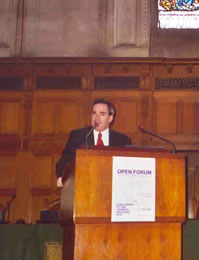|
|
Vol.
25 No. 4
July - August 2003
IUPAC
Briefs Delegates to CWC Review Conference
by
Edwin D. Becker
<
CWC First Major review completed
On 1
May 2003, IUPAC completed a two-year project to advise the
Organization for the Prohibition of Chemical Weapons (OPCW)
by briefing delegates to the First Review Conference of the
Chemical Weapons Conventions in The Hague, Netherlands. The
presentation drew on findings from the IUPAC Workshop on Impact
of Scientific Advances on the Chemical Weapons Convention,
held in Bergen, Norway, in July 2002.
 |
| Chris
Murphy presenting the IUPAC report to the Open Forum of
Non-Governmental Organizations, 1 May 2003 |
Dr.
Christopher K. Murphy (U.S. National Research Council), who
had served as coordinator of the IUPAC workshop, made the
presentation. The IUPAC briefing highlighted four key issues:
1.
Technical Challenges to the CWC. New synthetic methods (including
biosynthesis) provide novel routes to toxic chemicals that
were not envisioned when the CWC was negotiated over a decade
ago. In addition, globalization of the chemical industry has
resulted in an increased number of modest size batch facilities
in many countries that could be used for illicit purposes.
Future developments in using database mining to search for
toxic effects in new chemicals and introduction of microreactors,
which have little resemblance to normal chemical plants, pose
additional risks. Ongoing efforts by the industry to mandate
responsible handling of toxic substances may alleviate these
risks, but IUPAC pointed to the need for the OPCW Technical
Secretariat to remain abreast of current developments in order
to recognize the potential for misuse during inspection of
worldwide chemical production facilities.
IUPAC
urged that the Technical Secretariat be equipped with
smaller, lighter, and more portable instruments
|
2.
Advances in Analytical Techniques. Counterbalancing the challenges
posed by improved synthetic methods are advances in analytical
chemistry that provide more sensitive ways to detect small
amounts of toxic substances. IUPAC urged that the Technical
Secretariat be equipped with smaller, lighter, and more portable
instruments, such as GC/MS (gas chromatograph/ mass spectrometer),
which are currently available, and to acquire newer instruments
that do not require sampling (e.g., portable isotopic neutron
spectrometers). The workshop also identified trends in analytical
methods that will provide future instrumental methods, such
as "lab on a chip" technology and immunoassays.
IUPAC noted that with continually improving instrumental sensitivity,
agreement is needed on a practical "zero" to indicate
absence of a substance.
3.
Technical Capability of the Secretariat. Continuing professional
development of the Technical Secretariat is essential to increase
awareness of new chemicals and production techniques, to take
advantage of advances in analytical methods, and to make intelligent
investments in new equipment. IUPAC urged OPCW to provide
adequate resources to ensure that the Secretariat retains
and enhances is technical capabilities. Regular seminars and
training sessions are needed.
4.
Education and Outreach. There is a need for greater worldwide
understanding and appreciation of the CWC and its impact.
IUPAC urged that the OPCW Secretariat and the National Authority
in each of the 151 States Parties work together with national
and international scientific organizations and with chemical
industry associations to improve education and outreach to
the worldwide scientific community. IUPAC and other scientific
organizations should continue to assist OPCW and its States
Parties by advising on continuing advances in relevant science
and technology and by recommending experts who could be called
on as needed.
IUPAC
and other organizations emphasized that a principal strength
of the treaty lies in the general purpose criterion. The CWC
totally prohibits the development, production, acquisition,
stockpiling, or retention of chemical weapons. However, in
order to promote the peaceful uses of chemicals, it defines
chemical weapons, in part, as "toxic chemicals and their
precursors, except where intended for purposes not prohibited
under this Convention, as long as the types and quantities
are consistent with such purposes." The italicized phrase
focuses on the purposes of handling chemicals. It thus permits
the CWC to be applied to any substances developed in the future,
not only those chemicals that were specifically listed in
the treaty, but prevents the treaty from being misapplied
to chemicals, however toxic, intended for peaceful purposes.
The
briefing, presented at the Peace Palace in The Hague, was
part of an Open Forum designed to allow IUPAC and other non-governmental
organizations to address issues outside the formal sessions
of the Review Conference. Ambassador Rogelio Pfirter, director
general, OPCW, opened the Forum by noting the importance of
information about scientific and technical advances, the role
of the international chemical industry, legal issues, and
the status of destruction of world chemical weapons stockpiles.
The Forum also included an in-depth discussion of the implications
of the use of non-lethal chemical weapons, such as riot-control
agents.
The
IUPAC briefing followed a formal report to the director general
of OPCW, which was later published in Pure
and Applied Chemistry
74, 2323–2352 (2002). Director General Pfirter commented
favorably on the report and briefing in conversations with
IUPAC Vice President Leiv Sydnes and myself, who represented
the Union at the Review Conference. He recognized the utility
of continuing independent scientific advice to augment OPCW’s
own Scientific Advisory Board and expressed hope that IUPAC
would encourage dissemination of information about the CWC
and the work of OPCW.
Page
last modified 30 June 2003.
Copyright © 2002-2003 International Union of Pure and
Applied Chemistry.
Questions regarding the website, please contact [email protected]
|